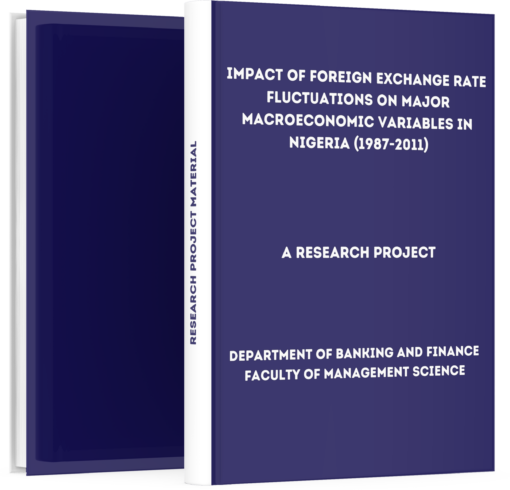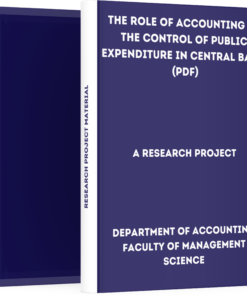Impact of Foreign Exchange Rate Fluctuations on Major Macroeconomic Variables in Nigeria (1987-2011)
₦3,000.00
If you are interested in getting this project material “Impact of Foreign Exchange Rate Fluctuations on Major Macroeconomic Variables in Nigeria (1987-2011)”, click on the DOWNLOAD BUTTON to make payment and the file will be delivered to your email immediately after confirmation.
Description
Download Impact of Foreign Exchange Rate Fluctuations on Major Macroeconomic Variables in Nigeria (1987-2011). Banking and Finance students who are writing their projects can get this material to aid their research work.
Abstract
Foreign exchange volatility affects the performance of macroeconomic indicators positively and negatively. Most import-dependent economies like Nigeria face the problem of foreign exchange rate volatility.
Nigeria’s over-dependence in the oil and gas sector of the economy has affected the major macro economic variables, and adverse foreign exchange rate regimes have affected the Nigerian economy over the years.
Nigeria’s major foreign earning is from oil; hence, volatility of crude oil prices in the world market has made the economy highly susceptible to the ever changing exchange rates.
Nigeria’s failure to diversify its economy which would have helped cushion the effect of the constant changes in oil prices has made the country susceptible to fluctuations in exchange rate.
This has had a heavy toll on our foreign reserves and invariably on our balance of trade and balance of payment. A proper foreign exchange rate management in many ways strives to balance the level of imports with that of exports of goods that the country has comparative advantage.
Introduction
There is scarcely any country that lives in absolute isolation in this globalised world. The economies of all the countries of the world are linked directly or indirectly through asset or/and goods markets, made possible through trade and foreign exchange.
The price of foreign currencies in terms of a local currency is therefore important to understanding of the growth pattern of economies of the world.
The history of exchange rate systems in Nigeria is traceable to the early 1960s. According to Bakare (2011:3), …before the establishment of the Central Bank of Nigeria in 1958 and the enactment of the Exchange Control Act of 1962, foreign exchange was earned by the private sector and held in balances abroad by commercial banks that acted as agents for local exporters…
The oil boom experienced in the 1970s made it necessary to manage foreign exchange rate in order to avoid shortage. However, shortages in the late 1970s and the early 1980s compelled the government to introduce some ad hoc measures to control excessive demand for foreign exchange.
However, it was not until 1982 that a comprehensive exchange controls were applied. Then a fixed exchange rate system was in practice.
How to Download this Project Material
First, note that we are one of the best and most reliable online platforms because we don’t retain any of your personal information or data as regards making payments online.
PRICE: ₦3,500 ₦3,000 (Three Thousand Naira Only)
Make a bank deposit or mobile transfer of ₦2,000 only to the account given below;
Bank Name: UBA Account Number: 1022564031 Account Name: TMLT PRO SERVICES
After making the payment, CLICK HERE to send the following on WhatsApp;
- Depositor’s Name or Screenshot of Payment
- Name of the Past Question
- Active Email Address
or Call Us On +2348082284439 Once your details have been received and your payment confirmed by us, you will receive the past question in your email or WhatsApp within 5 Minutes.
Guarantee of Getting the Material
We understand that due to the high rate of fraud, many people are afraid of making purchases online but be rest assured that PastExamQuestions will deliver your material after payment.
Once your details have been received and your payment confirmed by us, you will receive the past question in your email or WhatsApp.
Give us Feedback
Have we been able to satisfy you? How well do you think the material will be helpful after having gone through it? Does the price worth the material?
Let’s hear from you! We recommend that our customers give feedback at the end of every transaction to enable us to serve better. You can do this by clicking the review button on this page.
Where is the review button? >> Just scroll up to where you see reviews





Reviews
There are no reviews yet.